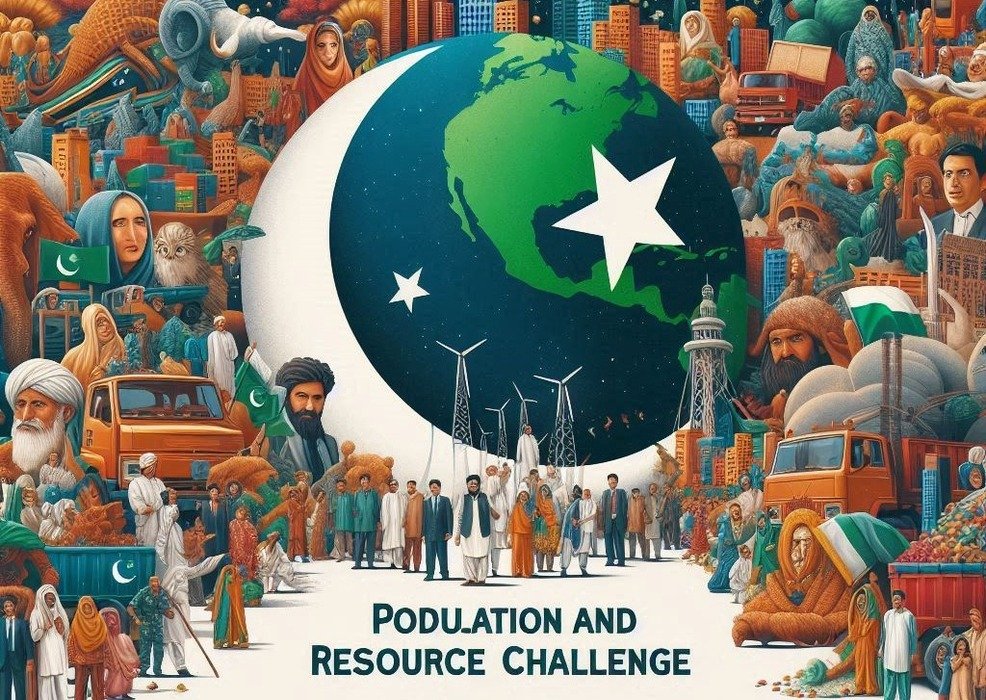Note from Pak NGOs: We are pleased to announce that this article is the best article in the competition. Congratulations to Mr. Amar Jaleel Kaloi for writing such a wonderful piece. Please note that the Pak NGOs team has edited it to correct minor errors and improve clarity.
Pakistan, with its rapidly growing population, faces a critical challenge that impacts every facet of its society. The average household in Pakistan comprises around seven children, leading to significant socioeconomic challenges. To address this issue effectively, it is imperative to understand the underlying causes and implement strategies for population control.
Lack of Awareness and Education
One primary reason for the high population growth in Pakistan is the lack of awareness and education about family planning, especially in rural areas. Many villagers do not have access to accurate information about family planning methods, leading to widespread misconceptions. For instance, some believe family planning means the cessation of childbirth rather than the proper spacing and timing of births.
To combat this, comprehensive education campaigns are necessary to inform the public about the benefits and methods of family planning. These campaigns should be culturally sensitive and tailored to address specific community needs and beliefs. Additionally, integrating family planning education into school curriculums can help build a foundation of knowledge from a young age.
Religious and Cultural Beliefs
Religious and cultural beliefs significantly shape attitudes toward family planning in Pakistan. Many people adhere to traditional beliefs that discourage the use of contraceptives and promote large families. Religious leaders and community influencers hold considerable sway over public opinion and can either support or hinder family planning initiatives.
Engaging religious and community leaders in the conversation about family planning is crucial. By involving them in designing and disseminating family planning messages, it is possible to create an environment where family planning is seen as compatible with cultural and religious values. Successful examples from other Muslim countries like Bangladesh and Iran, where religious leaders have endorsed family planning, can serve as models for Pakistan.
Economic Implications
Rapid population growth in Pakistan has significant economic implications. High birth rates contribute to unemployment, poverty, and strain on resources. The country is already grappling with issues such as inadequate healthcare, education, and infrastructure. With an increasing population, these challenges become more pronounced.
Family planning can play a vital role in economic development. By reducing the number of births, families can invest more in each child’s education and health, leading to a more skilled and healthier workforce. Additionally, smaller family sizes can alleviate the strain on public services and resources, enabling the government to allocate funds more effectively.
Access to Healthcare and Contraceptives
Limited access to healthcare and contraceptives is another critical factor contributing to Pakistan’s population growth. In many rural and remote areas, healthcare facilities are scarce, and contraceptives are either unavailable or unaffordable. Women often lack the autonomy to make decisions about their reproductive health due to societal norms and gender inequality.
Improving access to healthcare services and contraceptives is essential. The government and non-governmental organizations should work together to ensure that family planning services are available and accessible to all, regardless of geographic location or socioeconomic status. Mobile clinics and telemedicine can help reach remote areas while subsidizing contraceptives can make them affordable for low-income families.
Addressing Gender Inequality
Gender inequality is a significant barrier to effective family planning in Pakistan. Women often have little say in decisions about family size and reproductive health. Empowering women through education and economic opportunities is crucial for promoting family planning. When women have access to education and can participate in the workforce, they are more likely to delay marriage and childbirth, leading to smaller family sizes.
Programs aimed at increasing girls’ education and women’s participation in the workforce should be prioritized. Legal and social reforms to protect women’s rights and promote gender equality can also have a positive impact on family planning efforts.
Government and Policy Interventions
Effective government policies and interventions are vital for addressing Pakistan’s population problem. The government should prioritize family planning in its national development agenda and allocate sufficient resources to implement and sustain family planning programs. Policies that promote family planning, such as tax incentives for small families and penalties for child marriage, can also be effective.
Collaboration with international organizations and leveraging global best practices can help Pakistan develop and implement successful family planning initiatives. Continuous monitoring and evaluation of these programs are essential to ensure their effectiveness and make necessary adjustments.
Public Awareness Campaigns
Public awareness campaigns are crucial for changing attitudes and behaviors toward family planning. These campaigns should use various media platforms, including television, radio, social media, and community events, to reach a broader audience. Highlighting the benefits of family planning, such as improved health, economic stability, and better quality of life, can encourage people to adopt family planning practices.
Role models and success stories from within communities can also be powerful tools for promoting family planning. When people see the positive impact of family planning on families similar to their own, they are more likely to consider it for themselves.
Conclusion
Pakistan’s population growth is a multifaceted issue that requires a comprehensive and integrated approach. By addressing the lack of awareness and education, engaging religious and community leaders, improving access to healthcare and contraceptives, promoting gender equality, and implementing effective government policies, Pakistan can make significant strides in controlling its population growth. Public awareness campaigns and community involvement are also crucial for changing attitudes and behaviors toward family planning. With concerted efforts, Pakistan can achieve sustainable population growth and improve the quality of life for its citizens.
The writer has been working in the social sector for more than ten years.





